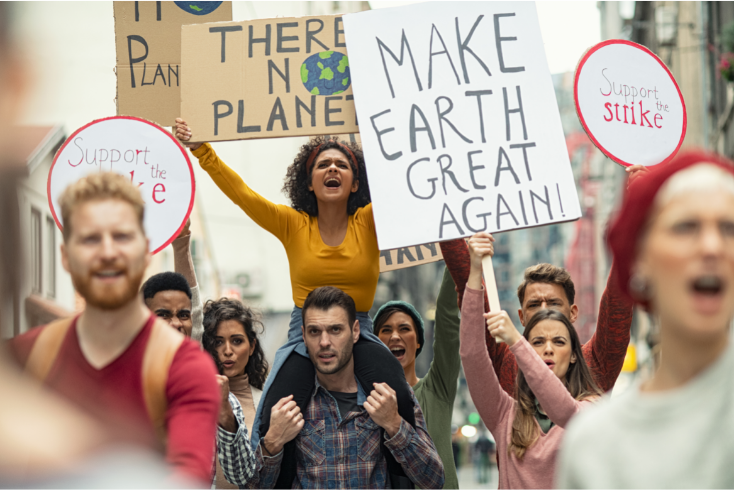Climate impact will increasingly shape our media choices

Strategy Leaders
What does the greatest challenge of them all mean for media strategy?
When pondering the future of media strategy at this time of year, my thoughts turn to New Year’s resolutions. Whether or not you’re one for setting them on a personal level, it’s always a good exercise to undertake when thinking about the year ahead from a professional perspective.
New Year is a time for good intentions, and as such it is important to think about what changes could have the most positive impact.
Put simply, the answer is right there in those two words. Positive impact.
The climate crisis is the greatest threat to humanity, and the experts tell us that we have less than a decade to make seismic changes to our carbon output. We can’t wait around for changes to be made; we must make changes ourselves.
Advertising has a rich history of influencing behaviour and as such our industry has the potential to be a real force for positive change when it comes to shaping the choices people make about whom they buy from, where they buy and how they buy. This also provokes some uncomfortable questions about over-consumption and the advertising industry’s role in this.
What is clear is that ‘consumer’ choice is increasingly influenced by sustainability. A great example of this is the recent large growth in electric vehicles (+70% year on year). According to our Covid Tracker, peoples’ expectations not only of government, but of brands, business and the media to actively address climate change is high, at over 50% for each of them.
How climate change is impacting media strategy
It isn’t simply a matter of how we can help create positive change. We also need much greater awareness of the carbon impact of what we do, and we need to act as a result of this.
There has been lots of progress in this area and the last 12 months has felt like a step change. Both the IPA’s Carbon Calculator and the AA’s Ad Net Zero initiative (of which Havas is a supporter) are great strides in the right direction.
But what does this mean specifically for media strategy? One thing is certain; it will transform the way that we build it.
I see this being done in two main ways. Firstly, through the work that we do and secondly through how we and operate and structure ourselves.
 Eva Grimmett
Eva Grimmett
To start with the work that we do: to strip back communications strategy to its simplest description, it is ultimately about creating communication opportunities out of the insights that sit at the intersection of brand, audience, media, culture and category (and their impact on business performance). The space at the intersection must now include climate, adding another layer of complexity to media strategy.
Ultimately climate impact will increasingly shape the media choices that we make as we seek to optimise to carbon reduction as well as attention and cost.
We will see greater discrimination against media environments and formats that have a higher carbon output, which should, in turn encourage further carbon reduction in media product development. I can see a scenario where all ad formats have a carbon output on them, which will further permeate the conversation.
We need more sustainability expertise
When it comes to structure and how we operate, I think we need to start building sustainability expertise within strategy teams. Many agencies have created important roles such as ‘Sustainability Officer’ to spearhead this at an operational and visionary level, however, we need to make changes at a day-to-day level, too.
Climate impact needs to be addressed and discussed at the inception of campaigns, which is where strategists usually have most influence.
There are several things that we need to start doing:
- Actively have conversations. We don’t need to have all the answers, but we need to start asking the questions. Talk to clients about the IPA Carbon Calculator and discuss with them what it might mean for the evolution of their media strategy and plans. Undertake the Ad Net Zero Essentials Training. Get involved with the Change the Brief Alliance.
- Ensure due diligence in exploring the influence of climate change when it comes to unearthing insight about what a target audience expects and how the category is responding. This means addressing it whether or not the brief references climate change.
- While it requires us to learn as we go, we also need help from those with more knowledge. I’ve spoken about the use of freelance talent within strategy teams, and it strikes me that this is an area with so much potential. There is opportunity in inviting those with a deep knowledge of sustainability into our strategy teams to help us transform our thinking in this area.
When it comes to the climate crisis, there needs to be a concerted collective push at an industry level, that said, I believe that our strategy teams are key to unlocking the changes that need to happen. The only difference with this New Year’s resolution is that is must last beyond the end of January and become a life-long habit.
Eva Grimmett is chief strategy officer at Havas Media Group
Strategy Leaders: Mediatel News’ weekly bulletin with thought leadership, news and analysis dedicated to excellence in commercial media strategy.
Sign up for free to ensure you stay up to date every Tuesday.



